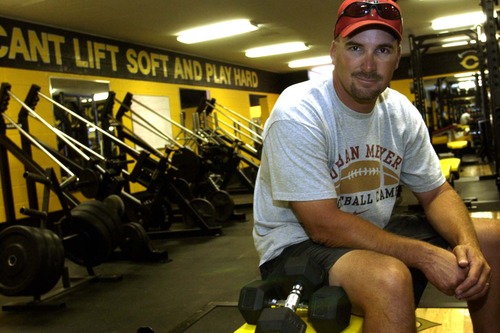This is an archived article that was published on sltrib.com in 2012, and information in the article may be outdated. It is provided only for personal research purposes and may not be reprinted.
Before the Philadelphia Eagles drafted him, Stanley Havili was a Salt Lake City kid with shaky prospects.
His first semester at East High, Havili earned only a 0.7 grade point average. Some of his friends joined gangs and went to jail. Others wound up dead.
But Havili realized his potential as a standout athlete at Cottonwood High, a school with a football program amped up by millions of dollars donated by benefactor Scott Cate. Havili went on to earn a scholarship to the University of Southern California before joining the NFL in 2011, an achievement he credits to Cate.
"I'm pretty sure I'd probably be working at the airport throwing bags on a plane if it wasn't for him," said the 6-foot, 245-pound Havili, his voice breaking with emotion during a Granite District School Board meeting in July. "But now I have the opportunity to provide for my family doing something I love."
For more than a decade, hundreds of teenagers such as Havili benefited from Cate's passion for football and his deep pockets before all that slammed to a sudden stop this summer amid questions about football-program finances at Cottonwood in Murray and other Utah high schools.
What started late last year as a probe into Timpview High School's team grew into a statewide investigation. The review lifted the veil on sloppy financial practices within a number of Utah programs including Cottonwood's, where Cate was allowed to donate more than $3 million with little documentation.
In an attempt to clean up Cottonwood's finances, the Granite board passed a new donations policy that, among others things, prohibits big-time donors such as Cate from coaching. Insulted, Cate withdrew his support for the program.
"This is ridiculous. He helped the community," Havili's father, Tevita Havili, told The Salt Lake Tribune. "If it weren't for Scott, my kids wouldn't have gotten this far."
But district leaders maintain the policy was long overdue and accept responsibility for years of financial haphazardness.
"This isn't a recent problem," said district spokesman Ben Horsley. "It's in relation to following our own policies ensuring state law is adhered to. ... These problems didn't begin with some of the people we have in place now but they're going to end with us."
—
Poor documentation • District documents show a number of issues during the past decade concerning the handling of donations. But the records — obtained by The Tribune through an open records request — are perhaps more notable for what they don't show.
In October, Granite sent Cate and his wife a letter thanking them for their donations over the past 13 years. That letter listed $3.25 million worth of donations — everything from football uniforms to a press box to a new football field. Cate, a former University of Utah quarterback, became wealthy building and selling an international telecommunications company. The last of his children graduated from Cottonwood about three years ago.
But that letter, in most cases, is where the district's documentation of those donations ends.
The district doesn't have records of everything Cate donated. Granite also was unable to fulfill a records request from The Tribune for emails between district personnel and Cate during the past decade.
Granite attorney Doug Larson said the district could find no such emails, possibly because of technical problems with its archival system.
A recent state audit confirmed that Cottonwood construction projects funded by donations, including a weight room, baseball practice facility, press box and football field, were not properly overseen or accounted for by Granite.
"Because these projects were funded by and constructed under the direction of the donors, the district abdicated much of their responsibility for the projects to the donors," the audit said. "However, state law does not give any exemptions related to construction depending on the funding source; therefore, all state laws and rules apply to donated projects."
Lack of district oversight even caused occasional confusion during construction, such as when Cate donated money in 2000 for a storage shed and snack shack. An architecture-company principal wrote a letter to the district's facilities director at the time expressing confusion over whether Cate or the district was in charge of the project.
"It is unclear to me," wrote Kevin Reisch, "who the funds are coming from and who I would be under contract for services."
Horsley said the district's new policies and training should prevent such confusion.
"If somebody wants to do something on public land that's owned by the taxpayers, there should be an approval process," Horsley said.
But Cate said he never saw a need for more district involvement — nor a desire from the district to become more involved.
"I can't tell you how many times they requested me to build stuff for them, and they never said, 'Oh, gee, Scott, please stop and go through the process,'" Cate said. He said the district was always fully aware of what he was doing, and he worked with them many times to make sure everything met safety and other standards.
Cate said increasing the district's involvement would only complicate future projects.
"Every time the district stuck their nose into one of my projects, and I'm not exaggerating, the cost went up three times," Cate said.
He said it's part of the reason he no longer wants to donate to Granite. He doesn't want to see his hard-earned money go to waste.
The district's new policy requires Granite's superintendent to approve all gifts or donations of more than $10,000, and the board must approve all donations of more than $50,000. The policy also, infamously, prohibits those who donate more than $499 in a year from serving in any decision-making capacity within district programs or activities.
That brought an end last summer to Cate's volunteer position as offensive coordinator for the team.
—
Support withdrawn • Cate doesn't know why schools would want to make generous donors jump through hoops.
A number of Cottonwood football parents feel the same way.
"Policies like these will guarantee a sort of chilling effect on community involvement," Cottonwood parent Greg Ford said at the July board meeting.
Vicki Johnson, a recent Cottonwood football booster-club president, said she believes the policy sought to get rid of Cate because some within the district felt it wasn't fair for Cottonwood to have advantages other schools did not.
"Instead of trying to prop up the rest of the schools in the district, they just felt like they had to take Cottonwood out," Johnson said. "There's not one single doubt in my mind the policy was a personal vendetta."
But others say allowing donors to wield positions of power within schools invites trouble.
Granite Superintendent Martin Bates said a main reason for the decision to exclude big donors from coaching was to prevent them from exercising improper influence because of their donations.
"I don't know that I can point at a decision that was made because of Scott Cate's influence," Bates said, "but I do know from reports from all over the district that there are concerns about the influence that donors had."
He said that the policy was not aimed specifically at Cate and was not enacted to take Cottonwood down a notch.
Cate said he felt insulted by the way the district ousted him. When he withdrew his support for the team, he took back some of the equipment he had donated.
In some cases, he sold the equipment back to Cottonwood below market value, Larson said. But still, the school shelled out nearly $85,000 to buy back from Cate concession-stand and weight-room equipment, a press-box announcement system, a truck, a turf groomer, dummies, football sleds, hurdles and a time clock, among other things, according to district documents.
Horsley noted the district provides such items to all its programs.
According to state law, cash or property should become public money or public property once it's donated, said Carol Lear, director of school law at the State Office of Education. But Horsley said the items weren't properly documented as donations, so there was nothing to stop Cate from taking them back.
The school also ran into other unexpected costs, such as a $150,000 bill to repair deteriorating football turf installed under Cate. Cate had originally agreed to pay for the turf replacement, but Granite was left holding the bag this summer after Cate withdrew his support, according to a July letter between district administrators.
Cate said he never wanted to hurt kids and has since donated some equipment he took from Cottonwood to East High. He said he also donated the money Cottonwood paid him for equipment to schools out of state.
Bates said the district since has implemented a process to ensure items donated to schools are properly documented.
But Johnson said all the additional costs could have been avoided by allowing Cate to continue coaching.
"As a taxpayer, it very much aggravates me to know, in no uncertain terms, that there was money spent on a football program this year that did not need to be spent," Johnson said.
—
A statewide problem • Inconsistent documentation and confusion over money donated to sports and other activities are not problems unique to Cottonwood.
State auditors concluded that "similar problems would be found at other districts and schools" after auditing programs at Cottonwood, Davis, Fremont and Alta high schools.
Auditors began their investigations after questions arose about finances within Timpview's programs. Those allegations ultimately resulted in Timpview football coach Louis Wong resigning earlier this year.
Horsley said nothing in the Cottonwood audit was a surprise. He said the district already had been investigating the situation for some time when the audits were released.
Larson acknowledged the district wasn't accepting donations appropriately in every case and doesn't have all the documentation it should.
"We have a very generous donor here, and, at least in the past, the attitude has been we didn't want to do anything to discourage that donor from providing services or providing facilities for our kids that would be a benefit to them," Larson said.
He suspects that's why many districts haven't tightened up their donations policies: They fear scaring off donors.
But Horsley said those now running the district recognize the law must be followed for the sake of taxpayers and students.
It's something state education leaders hope to fix throughout Utah. The State Office of Education held a number of training sessions earlier this year for district employees on how to manage finances for sports and other activities. And the state school board is creating a new rule addressing the issue.
The rule would require school districts and charter schools to develop their own policies establishing, among other things, an acceptance and approval process for donations and barring donations to individual school employees, students or vendors.
It's a rule meant to help guide teachers and coaches on how donors and donations should be handled. It's a rule, essentially, meant to protect schools, donors, educators, students and parents from themselves.
Twitter: @lschencker







